Nature is judging you
NATURE IS JUDGING YOU
The animals are watching! And they’re taking notes when it comes to how you treat their habitat. Whether it’s your first mountain hike or your hundredth kayak outing, a bird may start chattering as you pass if you’re not respecting its home or being kind to the other humans you encounter along the way.
Curious to see where you stand when it comes to minding your manners?
Enter Ranger’s quiz!
When he’s taking a break from his trashcan searches, Ranger has witnessed the best and the worst when it comes to minding your manners outdoors.
Are your actions living up to his expectations?
Ranger might be judging you,
but he’s also your biggest fan when you try to respect the environment and the other people you meet.
Take the quiz for your chance to win the perfect kit for your next adventure worth $500!
IT’S NICE TO S‑H‑A‑R‑E!
When you venture into Nature, every outing is an invitation to discovery. But remember, with this freedom comes the responsibility to act with courtesy and respect.
We all SHARE the great outdoors, and we improve everyone’s experience by taking 5 simple actions. Say ‘Hi!’, hear the voice of Nature, pay attention to the details, respect your surroundings, and erase your waste.
SAY ‘HI!’
A simple smile or friendly “hello” improves everyone’s experience. It’s a sign of mutual recognition and your first step towards sharing space in a respectful way. Bonus: it’s also a great mindfulness technique that allows you to connect and stay in the present moment!
HEAR THE VOICE OF NATURE
To fully appreciate nature, you must listen to it. Sounds can signal the proximity of animals, other people, or potential dangers. So even if you love Taylor Swift, turn off the tunes when you’re outside, and let nature be your soundtrack.
PAY ATTENTION
In order to the right thing in the right place, you have to look around you. Observe the signs, respect the direction of the trails, the instructions and those who are around you. Each place and each activity have its own rules. When in doubt, ask!
RESPECT YOUR SURROUNDINGS
The key to a successful outdoor experience is harmonious cohabitation. After all, everyone has the same rights when it comes to enjoying nature. Respect the guidelines, give priority to those that are most vulnerable and slow down when encountering others along the way.
ERASE YOUR WASTE
Whether your waste is biodegradable or not, don’t leave it on the ground. It’s a question of respect for nature and others. Have a little extra energy? Pay it forward by picking up what doesn’t belong to you!
A GUIDE TO MINDING YOUR MANNERS
Each activity has its own code of conduct. Choose the one that speaks to you and learn about its outdoor etiquette.
Fat biking
Non-motorized trail activities
- Adapt your speed: reduce your speed depending on snow and ice conditions to avoid accidents. Make sure to exercise caution, especially on descents.
- Respect others: give priority to pedestrians and adapt your speed accordingly. Don’t forget to announce your presence in a courteous and considerate manner.
- Give warning when you’re passing: warn others in a courteous and respectful manner when you wish to overtake them.
- If you stop: stand to the side of the path so as not to obstruct traffic.
- Avoid skidding: control your speed on descents and avoid skidding to preserve the trails.
Snowshoeing
Non-motorized trail activities
- Respect the trails: make sure you stay on the trails reserved for your activity. Avoid walking on trails marked for skiers in order to preserve their quality.
- Respect priorities: let skiers pass, they always have priority. Maintain a safe distance and allow them to pass without hindrance on shared paths.
- Make the work of trail-makers easier: if you take a shared circuit, walk to the side to avoid damaging the ski trail. It also helps maintain a harmonious relationship between people who practice different activities.
- Don’t obstruct the trail: when you take a break, move to the side of the path to provide room for others.
- Pick up your trash: make sure you leave the trails clean by picking up your trash (even the smallest pieces!).
Ice fishing
Exploration and adventure
- Be informed: before starting, find out about local regulations, make sure you have paid fishing fees and respect catch limits.
- Respect others: treat everyone with respect, even in the event of disagreement. This includes respecting the fishing grounds of others and limiting any disturbance.
- Share space: make sure you don’t clutter the paths. The key is mutual respect and sharing the body of water.
- Before leaving: check if you need to declare your catch and weigh your fish. You’ve already caught on: fishing is not an activity that is improvised – make sure to follow the rules!
- Respect the ecosystem: don’t leave any waste behind and make sure you dispose of it properly. It seems obvious, but it’s always worth remembering.
Hunting
Exploration and adventure
- Share the territory: honour the right of all to move freely on public territory and remember, game is a collective good that belongs to everyone.
- Limit your territory: reasonably restrict the extent of your hiding area and make sure not to block access to roads, bridges, trails, and forest paths.
- Share the space: accept the presence of others in the area and prepare to share the forest equitably while respecting everyone’s rights.
- Make your presence known: use visible signs to inform other hunters of your activity in the area, thus promoting mutual communication and safety.
- Respect hunting zones: respect the hunting rules that apply in these zones, but also the rules specific to the territories you are frequenting.
Spelunking
Exploration and adventure
- Be prepared: make sure you have all the necessary equipment, in good working order, before starting your underground adventure.
- Be informed: before entering a cave, check if you are on private land. If so, make sure you have the necessary permissions before getting started.
- Coordinate your visit: be aware of other visits in progress, be courteous, and make sure to respect the times set by site managers or owners.
- Leave no trace: avoid touching fragile rock formations or leaving traces on the walls. Any contact can cause lasting damage.
- Obey warnings: exercise caution and obey all signs and restrictions, avoiding areas marked as dangerous.
Off-road vehicle touring
Motorized activities
- Be informed: find out about local regulations and restrictions regarding the use of ORVs. Each region may have its own rules.
- Give priority: on a shared trail, slow down and always give priority to those who are not on vehicles. Maintain a good distance so that everyone can enjoy their activity safely.
- Stay on your trail: only use trails designated for ORVs. Avoid venturing off-trail, as this can damage the ecosystem and put others in danger and cause you to lose valuable rights of way.
- Reduce your speed: When approaching residential areas or areas frequented by others, reduce your speed to ensure everyone’s safety.
- Pick up your waste: preserve the natural beauty of the regions you pass through. Don’t leave any waste behind and make sure you dispose of it properly. If you can bring your lunch, you have room to take the garbage away with you.
Snowmobiling
Motorized activities
- Stay on designated trails: venturing on trails where snowmobiling is not authorized is both illegal and dangerous.
- Respect private property: Make sure you do not enter onto private property trails without permission. This is illegal and may result in the closure of authorized trails.
- Reduce your speed: When approaching residential areas, respect speed limits by slowing down to ensure the safety of pedestrians and children who may be nearby.
- Do not modify your exhaust: modifying your exhaust system is illegal and causes noise pollution.
- Pick up your trash: preserve rights of way for trails and the natural beauty of the areas you pass through. Don’t leave any waste behind and make sure you dispose of it properly.
Sailing on ice
Gliding sports
- Be informed: make sure you respect the international, national, and local navigation laws that are enforced on the body of water you’re sailing on.
- Don’t be a disturbance: avoid playing music at full volume through the boat’s speakers or a portable one.
- Keep your distance: when navigating, make sure to maintain a reasonable distance from others.
- Respect the ecosystem: do not throw waste or relieve yourself overboard. It seems obvious, but it’s always worth remembering.
- Be courteous: respond to greetings from other sailors and listen to their needs and concerns. Mutual respect is essential on the water.
Snowkiting
Gliding sports
- Before you take off: make sure the area you are launching into is open to snow-kiting. If it’s private land, politely ask permission to be there and find out about its provisions for enjoying the sport in this space.
- Practice with caution: establish a safe distance from other people on site. If an incident occurs, keep calm, and approach the situation courteously.
- Think about others: When you’re not using your equipment, keep it organized and stored away to give others space. Be careful when launching or landing your kite.
- Avoid risky areas: the entrance of rivers or streams, currents and salt water are places where water might not be completely frozen over. Be careful of thin ice, barbed wire or fences which may be difficult to see.
- Ride the courtesy wave: if you think you can ride wherever and whenever you want, remember that with snow-kiting, it’s your courtesy and your respect that make you a legend.
Rock climbing
Exploration and adventure
- Respect local codes of behaviour: find out about the specific rules and access conditions of climbing sites and follow them thoroughly. Don’t forget to remain polite and say hello to the people you meet.
- Respect access instructions: contribute to the maintenance of climbing sites by paying access fees and respecting private or restricted areas.
- Avoid tailgate parties: when you leave your climb, especially in an urban environment, take your car and move far from the residents surrounding the site if you want to enjoy a get-together.
- Share the rock: be aware of other climbers, clear routes as soon as possible, and communicate courteously.
- Minimize your impact: pick up your waste, stay on the trails and move away from crowded areas when nature calls. Avoid music or drones, their echo can be heard and can jeopardize communication between climbers.
- Have a way to communicate: make sure you can communicate and share your exit plan with your group and with the person remaining at base camp.
Swimming
Non-motorized water activities
- Be informed: make sure you choose areas where swimming is authorized and safe. If you’re on private land, politely ask permission to use it.
- Share space: don’t monopolize the space and pay attention to other bathers to guarantee the safety and comfort of everyone.
- Exercise caution: avoid dangerous play and be vigilant around young children and non-swimmers. Maintain a distance from other water activities.
- Respect nature: Being relaxed and calm is encouraged, let the sounds of nature be the loudest! Avoid disturbing aquatic wildlife and make sure you don’t leave any waste behind.
- Keep water clean: Use sunscreen products and lotions without environmentally harmful substances that can harm water quality.
Watercraft
Motorized water activities
- Be informed: make sure you know and respect the navigation rules specific to personal watercrafts on your body of water.
- Keep your distance: when driving your watercraft, maintain a safe distance from other users to prevent any accidents.
- Respect the ecosystem: navigate responsibly, be aware of your impact on the water and always act with respect towards the fauna, flora, and others who are enjoying the space.
- Watch your speed: in busy areas, slow down to ensure everyone’s safety and comfort.
Horseback riding
Non-motorized trail activities
- Prioritize your horse’s well-being: familiarize yourself with the Code of Practice for the Care and Handling of Equines and follow its recommendations diligently.
- Adhere to the rules: respect the trail regulations and the instructions that are reserved for equestrian areas.
- You have priority: when you come across hikers or other riders, slow down and greet them. Even if priority is always for those on horseback, give way to them if necessary.
Ice climbing
Exploration and adventure
- Be informed: make sure you know the rules and access conditions, be courteous to site owners and managers. Follow the signs for parking and avoid sensitive areas.
- Limit crowds: climb in small groups to limit the impact on the environment and overcrowding on the routes.
- Share the ice: be aware of other climbers around you while keeping a safe distance. Communicate courteously and share the space equitably.
- Warn in case of danger: inform your rope partners or any other climber if pieces of ice fall.
- Have a way to communicate: Make sure you can communicate with your group. A person remaining at base camp should be able to communicate with each of the climbers during the ascent. Use the guardian angel principle by making sure someone knows your exit plan.
Quad driving
Motorized activities
- Use signals: Become familiar with the hand signals commonly used in quad driving to communicate with others.
- Respect land boundaries: make sure not to ride on private trails where quad driving is not authorized. Farmlands are not playgrounds for quad riders.
- Reduce your speed: When approaching residential areas, moderate your speed so as not to disturb residents or damage the reputation of quads. Kick up too much snow near houses and your right of way melts away faster than a snowflake on a sunny day!
- Pay attention to lighting: if you have added additional headlights to your vehicle, make sure to turn them off when you pass other users. Lights installed on the roof of an autoquad are prohibited at all times.
- Keep to the right: When turning, practice responsible driving by staying to the right. Avoid skidding, as it damages trails and poses a danger to oncoming drivers.
Alpine skiing
Gliding sports
- Be prepared: make sure you have all the necessary information and equipment before you start. Plan your day, check avalanche risks, and prepare for potential bad weather.
- Control your speed: control your speed and direction. Make sure you can stop and avoid obstacles at all times.
- Move wisely: when going uphill, follow the markers and let faster skiers pass. When descending, adapt your trajectory to your skills and maintain a safe distance from others. Respect everyone’s limits and control your speed and direction.
- Pay attention: descending skiers have priority, so if you’re moving uphill or crossing a slope, look carefully in all directions and let those going downhill pass.
- Minimize your impact: avoid disturbing local flora and fauna. Respect wildlife by keeping your distance and controlling your dog if you have one.
Cross-country skiing
Gliding sports
- Control your speed: adapt your speed to the conditions and traffic on the trail. Avoid steep descents, especially if your technique is at a beginner level.
- Respect priorities: let the fastest cross-country skiers pass and give priority to those going down the trail. On shared trails, pay attention to the signs around you.
- Keep to the right: always keep to the right on the path to allow safe overtaking. Don’t forget, zigzagging is only used when moving from one double-track to another.
- Announce when your overtaking: before passing another skier, announce your intention by saying, “On your left”. Also signal any sudden stop or change of direction.
- Follow local rules: Familiarize yourself with site-specific regulations and follow them carefully. Find out about the trails reserved for different activities.
Boating
Motorized water activities
- Be informed: be aware of the navigation rules, the required safety equipment, and the particularities of the body of water where you’re boating.
- Plan your outing: make a navigation plan that considers others who are on the water and the specifics of the environment. Don’t just rely on Google Maps.
- Respect the ecosystem: do not throw waste overboard or empty your toilet into the body of water. It seems obvious, but it’s always worth remembering.
- Keep your distance: when you are sailing, be careful not to encroach on the space of other boats. Pay attention and be vigilant at all times, especially in busy areas.
- Moderate your volume: avoid loud music, especially when anchoring in the evening. It’s important to maintain the peace and quiet of the area.
Water skiing
Motorized water activities
- Be informed: familiarize yourself with the areas reserved for water skiing and the safety rules that must be respected.
- Respect the environment: avoid disturbing aquatic fauna and make sure to keep the water clean.
- Pay attention: make sure to concentrate and be vigilant while waterskiing, pay attention to other water activities in the area and adapt your behaviour so as not to disturb them.
- Navigate with courtesy: respond to others’ greetings and listen to their needs. Be kind to the boats that tow you and the spectators at the water’s edge.
Diving
Non-motorized water activities
- Make your presence known: use a surface marker or buoy to signal your presence to other users. Make sure you always dive with another person.
- Share space: accept the presence of other divers on the site and prepare to share the space.
- Be responsible: avoid consuming any substance that impairs your faculties such as alcohol or drugs before and after diving.
- Respect the ecosystem: avoid disturbing the underwater fauna and flora. Keep the dive site clean and bring a bag to collect all your trash.
Canoeing
Non-motorized water activities
- Be prepared: plan your route based on the abilities of your group. Find out about water conditions, navigation rules, and areas to avoid.
- Respect the right of way: non-motorized boats do not have priority, so pay attention to other boats. Keep to the right when you pass another boat and stay close to the shore.
- Respect wildlife: pay attention to the impact of your activity on fauna and flora and avoid sensitive areas. Observe wildlife from a distance and do not feed wild animals.
- Be courteous: stay on the lookout to help others if necessary and be willing to adapt your activity to suit them. Keep in mind that sound travels more clearly on water, make sure to moderate your volume accordingly.
- Share space: make sure not to monopolize space, pay attention to others and maintain a safe distance from them to avoid collisions and any other inconveniences.
- Exercise caution: if you’re canoeing in white water, you must be extra vigilant. In addition, make sure not to obstruct other paddlers who are trying to portage when you stop near the rapids to scout out the area.
Kayaking
Non-motorized water activities
- Be prepared: plan your route based on the abilities of your group. Find out about water conditions, navigation rules, and areas to avoid.
- Respect the right of way: non-motorized boats do not have priority, so pay attention to other boats. Keep to the right when you pass another boat and stay close to the shore.
- Respect wildlife: pay attention to the impact of your activity on fauna and flora and avoid sensitive areas. Observe wildlife from a distance and do not feed wild animals.
- Be courteous: stay on the lookout to help others if necessary and be willing to adapt your activity to suit them. Keep in mind that sound travels more clearly on water, make sure to moderate your volume accordingly.
- Share space: make sure not to monopolize space, pay attention to others and maintain a safe distance from them to avoid collisions and any other inconveniences.
- Exercise caution: when kayaking in white water, you must be extra vigilant. In addition, make sure not to obstruct other paddlers who are trying to portage when you stop near the rapids to scout out the area.
Sailing
Non-motorized water activities
- Be informed: make sure you respect the international, national, and local navigation laws that are enforced on the body of water you’re sailing on.
- Don’t be a disturbance: avoid playing music at full volume through the boat’s speakers or a portable one, especially when you are at anchor in the evening.
- Keep your distance: when navigating, make sure to maintain a reasonable distance from others on the water.
- Respect the ecosystem: do not throw waste overboard or empty your toilet into the body of water. It seems obvious, but it’s always worth remembering.
- Be courteous: respond to greetings from other sailors and listen to their needs and concerns. Mutual respect is essential on the water.
Surfing
Non-motorized water activities
- Respect the lineup: clearly identify the person who is waiting ahead of you to ensure that everything flows, and you don’t make any waves amongst the group (the only lame play on words, we promise!).
- Actively prepare: be ready and in position at the indicated starting point so as not to miss your turn.
- Give priority: priority is always given to the one who arrives with the wave.
- Respect the allotted time: respect the allotted time depending on the number of people in line to surf. This is the secret to ensuring an enjoyable experience for everyone.
Kitesurfing
Non-motorized water activities
- Before you take off: make sure that the area you are launching into is open to kitesurfing. If it is private land, politely ask permission to be there and find out about the conditions for enjoying the sport. Also make sure you have the level of experience required for the practice site and the current conditions. If in doubt, it’s better to find an alternative spot.
- Give priority to the less experienced: in order to avoid a collision or accident during landing and takeoff, give priority to beginners or vulnerable riders, even when the priority belongs to you.
- Practice with caution: establish a safe distance from other people on site. If an incident occurs, keep calm, and approach the situation courteously.
- Avoid risky areas: do not venture onto unpredictable bodies of water or under high voltage lines. The risks are real for you and for rescuers, if they needed to reach you. Also avoid exploring new bodies of water if you cannot determine whether there are any potential marine hazards.
- Exercise caution and courtesy: when you land or take off, remember that the people around you cannot anticipate your maneuvers. Do it gently and don’t hesitate to advise them to ensure their safety. When you’re not practicing, keep your equipment organized and out of active areas.
- Ride the courtesy wave: if you think you can ride wherever and whenever you want, remember that in kitesurfing, it’s your courtesy and your respect that make you a legend.
Paddle boarding
Non-motorized water activities
- Be prepared: plan your route based on the abilities of your group. Find out about water conditions, navigation rules, and areas to avoid.
- Respect the right of way: non-motorized boats do not have priority, so pay attention to other boats. Keep to the right when you pass another boat and stay close to the shore.
- Respect wildlife: pay attention to the impact of your activity on fauna and flora and avoid sensitive areas. Observe wildlife from a distance and do not feed wild animals.
- Be courteous: stay on the lookout to help others if necessary and be willing to adapt your activity to suit them. Keep in mind that sound travels more clearly on water, make sure to moderate your volume accordingly.
- Share space: make sure not to monopolize space, pay attention to others and maintain a safe distance from them to avoid collisions and any other inconveniences.
- Exercise caution: if you’re paddle-boarding in white water, you must be extra vigilant. In addition, make sure not to obstruct other paddlers who are trying to portage when you stop near the rapids to scout out the area.
Rafting
Non-motorized water activities
- Be informed: make sure you know the navigation rules and conditions for accessing the site.
- Pay attention: listen carefully to your guide’s instructions and the needs of other participants to ensure a pleasant and safe experience for everyone.
- Cooperate with your team: Work in harmony and use clear signals with other members of your team to navigate efficiently and safely.
- Respect the environment: pay attention to the impact of your activity on fauna and flora and avoid sensitive areas.
- Stay calm: If you fall in the water, stay calm and follow the procedures to get back out quickly and safely, while paying attention to others.
Fishing
Exploration and adventure
- Be informed: before starting, find out about local regulations, make sure you have paid fishing fees and respect catch limits.
- Respect others: treat everyone with respect, even in the event of disagreement. This includes respecting the fishing grounds of others and limiting any disturbance.
- Before leaving: check if you need to declare your catch and weigh your fish. You’ve already caught on: fishing is not an activity that is improvised – make sure to follow the rules!
- Respect the ecosystem: don’t leave any waste behind and make sure you dispose of it properly. It seems obvious, but it’s always worth remembering.
Mountain biking
Non-motorized activities on trails or on the road
- Stay in control: adapt your speed to your abilities to avoid obstacles and choose routes suited to your skill level.
- Respect the signs: respect the indications of marked trails and avoid riding on closed trails that became recently wet trails in order to preserve their quality and avoid damage.
- Yield: on bi-directional trails, give priority to cyclists going uphill and respect others who are on the trails.
- Stop carefully: if you have to stop, choose a visible and safe place, set back from the path, so as not to disturb others.
- Offer help in the event of an accident: in the event of an accident, stay on the scene and work with emergency responders or witnesses to offer help if necessary.
- Respects others: always communicate before passing others downhill or uphill, leave enough space for the person in front of you and respect their speed.
- Respect your network:
- Ride in the path, don’t create your own line.
- When there are access fees, don’t forget to pay them.
- Report a break when you observe one on the trail.
- Get involved in a trail chore.
Road biking
Non-motorized activities on trails or on the road
- Obey the highway code: follow traffic rules, including traffic lights and signs. Avoid driving on the sidewalk.
- Respect the direction of the paths: correctly follow the unidirectional or bidirectional direction of the cycling paths, stay on your right, and adapt your speed for better fluidity.
- Prioritize pedestrians: always give priority to pedestrians and adapt your speed in shared areas.
- Overtake with caution: overtake only when it is safe and appropriate, and clearly announce your intentions to other road users.
- Stay predictable: maintain a stable trajectory and avoid sudden or unexpected movements to facilitate coexistence with other vehicles.
Roller skiing
Non-motorized activities on trails or on the road
- Keep your poles close to your sides: when approaching other users, bring your poles close to you or stop using them to avoid disturbing anyone or causing injury.
- Overtake carefully: wait until the centre or left lane is clear before overtaking and do so in a responsible way that doesn’t surprise or frighten others.
- Announce your presence: advise of your approach, by saying “Watch out on the left!” or “Track!”, for example. This informs those who are on the path of your presence and avoids a potential collision.
- Respect the direction of the slopes: always follow the indicated direction of a trail and never go in the opposite direction.
- Stay in line: if you are in a group, stay one behind the other so as not to take up too much space and respect other people who are enjoying the space, including cyclists and motorists.
Horseback riding
Non-motorized activities on trails or on the road
- Prioritize your horse’s well-being: familiarize yourself with the Code of Practice for the Care and Handling of Equines and follow its recommendations diligently.
- Adhere to the rules: respect the trail regulations and the instructions of the equestrian areas.
- You have priority: when you come across hikers or other riders, slow down and greet them. Even if priority is always for those on horseback, give way to them if necessary.
Quad driving
Motorized trail activities
- Use signals: Become familiar with the hand signals commonly used in quad driving to communicate with others.
- Respect land boundaries: make sure not to ride on private trails where quad driving is not authorized. Farmlands are not playgrounds for quad riders.
- Reduce your speed: When approaching residential areas, moderate your speed so as not to disturb residents or damage the reputation of quads. Kick up too much snow near houses and your right of way melts away faster than a snowflake on a sunny day!
- Pay attention to lighting: if you have added additional headlights to your vehicle, make sure to turn them off when you pass other users. Lights installed on the roof of an autoquad are prohibited at all times.
- Keep to the right: When turning, practice responsible driving by staying to the right. Avoid skidding, as it damages trails and poses a danger to oncoming drivers.
Hunting
Exploration and adventure
- Share the territory: honour the right of all to move freely on public territory and remember, game is a collective good that belongs to everyone.
- Limit your territory: reasonably restrict the extent of your hiding area and make sure not to block access to roads, bridges, trails, and forest paths.
- Share the space: accept the presence of others in the area and prepare to share the forest equitably while respecting everyone’s rights.
- Make your presence known: use visible signs to inform other hunters of your activity in the area, thus promoting mutual communication and safety.
- Respect hunting zones: respect the hunting rules that apply in these zones, but also the rules specific to the territories you are frequenting.
Spelunking
Exploration and adventure
- Be prepared: make sure you have all the necessary equipment, in good working order, before starting your underground adventure.
- Be informed: before entering a cave, check if you are on private land. If so, make sure you have the necessary permissions before getting started.
- Coordinate your visit: be aware of other visits in progress, be courteous, and make sure to respect the times set by site managers or owners.
- Leave no trace: avoid touching fragile rock formations or leaving traces on the walls. Any contact can cause lasting damage.
- Obey warnings: exercise caution and obey all signs and restrictions, avoiding areas marked as dangerous.
Off-road vehicle touring
Motorized trail activities
- Be informed: find out about local regulations and restrictions regarding the use of ORVs. Each region may have its own rules.
- Give priority: on a shared trail, slow down and always give priority to those who are not on vehicles. Maintain a good distance so that everyone can enjoy their activity safely.
- Stay on your trail: only use trails designated for ORVs. Avoid venturing off-trail, as this can damage the ecosystem, put others in danger and cause you to lose valuable rights of way.
- Reduce your speed: When approaching residential areas or areas frequented by others, reduce your speed to ensure everyone’s safety.
- Pick up your waste: preserve the natural beauty of the regions you pass through. Don’t leave any waste behind and make sure you dispose of it properly. If you can bring your lunch, you have room to take the garbage away with you.
Hiking
Exploration and adventure
- Respect the trails: make sure you stay on the trails reserved for your activity. Avoid walking on trails marked for skiers in order to preserve their quality.
- Respect priorities: let skiers pass, they always have priority. Maintain a safe distance and allow them to pass without hindrance on shared paths.
- Make the work of trail-makers easier: if you take a shared circuit, walk to the side to avoid damaging the ski trail. It also helps maintain a harmonious relationship between people who practice different activities.
- Don’t obstruct the trail: when you take a break, move to the side of the path to provide room for others.
- Pick up your trash: make sure you leave the trails clean by picking up your trash (even the smallest pieces!).
CONFESSIONNAL (POV)
Admit it, you were once that human!
Admit it, you were once that human! The animals know it, you know it, and there’s no need to be ashamed. It’s time to laugh at our little missteps— and learn from them.
Click, smile, and don’t forget to share!
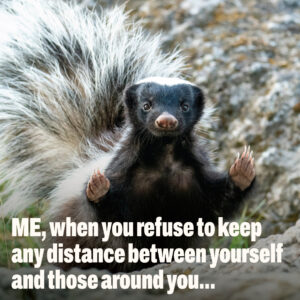
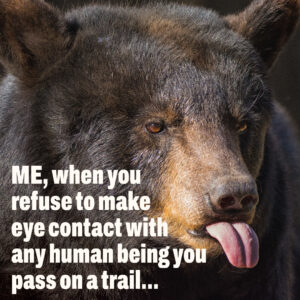

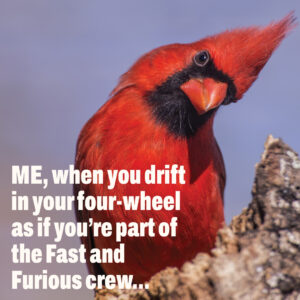


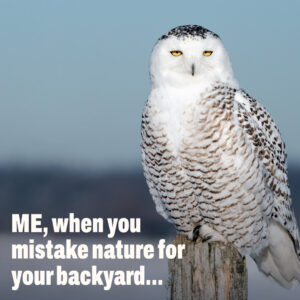
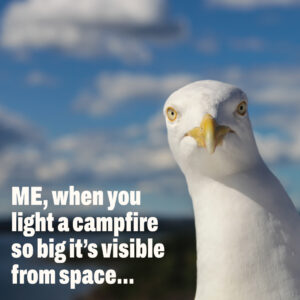
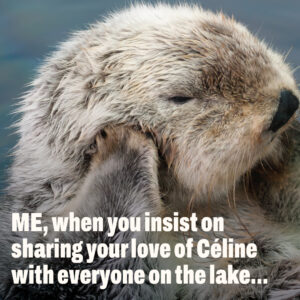
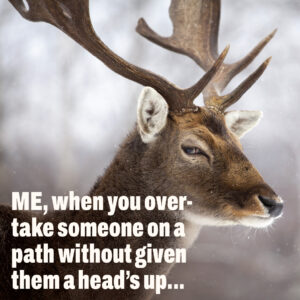
Because the beauty of natural spaces can sometimes hide some ugly gestures.
Because the growing love of outdoor space, heightened by the pandemic, is generating problematic behaviour and a lack of knowledge when it comes to acceptable codes of conduct.
Because by raising our awareness of courtesy and respect, by educating ourselves on the impacts of our actions and good practices, we ensure that nature remains a haven of peace for everyone.









